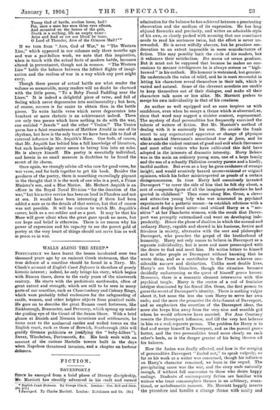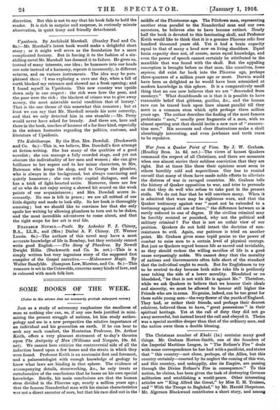FICTION.
DAVENPORT.t nos he emerged from a brief phase of literary discipleship, Mn Marriott has steadily advanced in his craft and earned
• Sirglialt Coast Detentes. By George Clinch. London : Geo. Bell and Sons. Ks. net.) Davenport. Py Charles Marriott. London : Hutchinson and Co. [Bs.] admiration for the balance he has achieved between a penetrating observation and the medium of its expression. He has long abjured fireworks and preciosity, and writes an admirable style of his own, so closely packed with meaning that one sometimes needs to read his sentences twice, but the effort is never un- rewarded. He is never wilfully obscure, but be practises con- densation to an extent impossible in mere manufacturers of fiction. This may possibly limit the circle of his readers, but it enhances their satisfaction. Res severe cst vaunt paudiutn. But it must not be supposed that because he makes no con- cessions to meaner intelligences he is always serious or " high- browed " in his outlook. His humour is restrained, but genuine. He understands the value of relief, and he in most successful in letting his characters reveal themselves in their talk, which is varied and natural. Some of the cleverest novelists are unable to keep themselves out of their dialogue, and make all their characters talk more or less alike. Mr. Marriott prefers to merge his own individuality in that of his creations.
An author so well equipped and so sane Inspires us with confidence, even when he essays a theme which is abnormal, or, since that word may suggest a sinister content, supranormsd. The mystery of dual personalities has frequently exercised the talents of writers of fiction. But Mr. Marriott'a method of dealing with it is eminently his own. He avoids the frank resort to any supernatural apparatus or change of physique which marked Stevenson's sensational tour de force, and he also avoids the violent contrast of good and evil which Stevenson and most other writers who have cultivated this field have adopted in the interests of dramatic intensity. Harry Belsire was in the main an ordinary young man, one of a large family and the son of a robustly Philistine country parson and a kindly, tactful mother. But even as a boy he gave evidences of strange insight, and would evasively hazard unconventional or original opinions, which his father misinterpreted aa proofs of a certain disingenuousness. In time Harry half consciously invented Davenport " to cover the side of him that he felt shy about, a sort of composite figure of all the iinminary authorities he had quoted in childhood." Then came along Mrs. Orme, a clever and attractive young lady who was interested in psychical experiments for a pathetic reason--te establish relations with a dead and deeply loved sister—and utilized Harry as a " sen- sitive" at her Planehette seances, with the result that Daven- port was promptly externalized and went on developing inde- pendently. Hence the phase of dualism in which the normal and ordinary Barry, capable and shrewd in his business, festive and frivolous in society, alternates with the seer and philosopher Davenport, who preaches the gospel of the brotherhood of humanity. Harry not only comes to believe in Davenport as a separate individuality, but is more and more preoccupied with the desire to find and meet him. He writes letters to himself and to other people as Davenport without knowing that he
wrote them, and as a contributor to the Pius achieves con- siderable success and distinction. Unlike most double lives, Harry's are both blameless, though the situation becomes decidedly embarrassing as the quest of himself grows keener. Moreover, there is a romantic element interwoven with this psychical tangle. Harry is the centre of a coil of feminine intrigue dominated by his friend Mrs. Orme, the first person to guess the secret of Davenport's identity. There is nothing vulgar about it, but none the less she uses Harry to serve her own ends ; and the more she promotes the detachment of Davenport, and so emphasizes the assertion of the Davenport ideas, the more she keeps hiin away from the very nice and sensible girl whom he would otherwise have married. For Ann Courtney resents the Davenport influence, and till the very last believes in him as a real, separate person. The problem for Harry is to find and merge himself in Davenport, and as the pursuit grows hotter, and the two personalities tread more closely on each other's heels, so is the danger greater of his being thrown off his balance.
How the fusion was finally effected, and how in the merging of personalities Davenport " fizzled out," to speak vulgarly, so far as his work as a writer was concerned, though his influence on Harry's character remained, we learn in the sequel. The precipitating cause was the war, and the story ends naturally enough, if without full concession to those who desire happy endings. Students of contemporary fiction are familiar with writers who treat commonplace themes in an arbitrary, sensa- tional, or melodramatic manner. Mr. Marriott happily inverts the procedure and handles a strange theme with sanity and
discretion. But this is not to say that his book fails to hold the reader. It is rich in surprise and suspense, in curiously minute observation, in quiet irony and friendly detachment.











































 Previous page
Previous page